Cultural Middleman : KPBS’ Hispanic Affairs Officer Makes Contact in Documentaries
- Share via
Sitting in his cramped KPBS-TV office, reflecting on his academic career, Paul Espinosa saw a link between the degrees in anthropology he earned from Stanford University and his current role as head of KPBS’ Office of Hispanic Affairs.
“Anthropologists try to tell people about other people not like themselves,” Espinosa said. “In essence, they’re working as mediators between different cultural groups. In a sense, that is what I’m trying to do.
“Through public television, I’m trying to address a general audience about Hispanics in a way they can understand. . . . I’m trying to establish contact.”
Espinosa, 39, made such contact with “In the Shadow of the Law,” and not simply with local audiences. The 1988 documentary tracing the lives of four undocumented families living in the United States was recently nominated for a national Emmy, the first such honor for KPBS (Channel 15).
“In the Shadow of the Law” was selected in the category of
Outstanding News and Documentary Program Achievement, Special Classification. The awards will be presented Sept. 12 at a black-tie dinner at the Waldorf-Astoria Hotel in New York.
Although the success of “In the Shadow” is unprecedented at KPBS, at least in terms of the Emmy nomination, the subject matter is in many ways typical of Espinosa’s work there.
The Office of Hispanic Affairs was created in 1980, with Espinosa as its first director, to provide programming--on the Hispanic experience and the interaction between the United States and Mexico--for both KPBS and the national Public Broadcasting System, Since 1980, Espinosa has produced, written and been host on more than 50 programs for KPBS.
“I see what I’m doing as twofold,” he said. “I want to produce programs that are interesting and important to Hispanics but also programs important to the general audience that is non-Hispanic. . . . The larger community has a role in shaping how the Hispanic community is treated.”
In discussing programming, Espinosa often sounds like the anthropologist he originally intended to be.
“I try to provide some connection points” between the Hispanic community and the general audience, he said. “The loves and aspirations of the Hispanic community are not that different from the audience’s own aspirations.”
Espinosa grew up in a culturally integrated atmosphere: Albuquerque, N.M., with its large Hispanic and Indian populations. There, he said, Hispanic role models--elected officials, teachers and doctors--are commonplace, unlike in most other parts of the country.
“In California, on Cinco de Mayo, they throw on a sombrero,” said Espinosa, who called the culture here “more diluted in a way. While growing up, I had a natural respect for cultural differences.”
Espinosa’s credits include “The Lemon Grove Incident,” an hourlong docudrama about the nation’s first successful legal challenge to school segregation, and “The Trail North,” a half-hour documentary, narrated by Martin Sheen, recounting one family’s journey from Mexico.
“The whole treatment by the media of the undocumented has been superficial and very stereotypical,” Espinosa said. “We’ve been inundated with images of people arrested at the border, hands on head, helicopter whirling overhead. It’s a very limited image.”
“In the Shadow of the Law” went beyond the stereotypes to show how four families managed to live in the United States despite their illegal status. All four had been in this country more than eight years.
“It helps that Paul’s educational background is in anthropology,” said Eduardo Diaz, director of the city of San Antonio, Texas’ Department of Arts and Cultural Affairs and the former director of an international Hispanic film-video festival at which Espinosa’s work has been screened. “He looks at a subject from a real inclusive perspective. I’m always impressed that he goes beyond the basic facts and looks at the human perspective.”
“In the Shadow of the Law” originally aired on KPBS in November, 1987, and was repeated on the national PBS system in February, 1988. It was produced and co-written by Espinosa and would not have been made if not for a $170,000 grant he won from the Corporation for Public Broadcasting.
Competition for such money is fierce, but Espinosa is considered a master of the game.
“He knows how to write proposals and raise funds--it’s a real skill,” ex-KPBS producer Matthew Eisen said.
After earning his bachelor’s degree in anthropology from Brown University in Providence, R.I., Espinosa spent a year writing grant proposals for the school. It is his writing experience, as much as the network of contacts he has developed within the industry, that has led to Espinosa’s success in winning grants.
“You have to be able to really communicate quickly and effectively and catch people’s attention,” he said. “That may be more important than politicking.”
Espinosa never took a course in broadcast journalism during his academic career, which culminated with a Ph.D. in anthropology from Stanford. In fact, his family never owned a television set until he was 16 years old. It wasn’t that they couldn’t afford one; they just had no interest in it. Espinosa himself avoided TV ownership until he was 26.
His first exposure to television was as an intern with KPBS’ science office. Intrigued, he did his dissertation for Stanford on the “Lou Grant” show, tracking the development of issue-oriented episodes.
He stayed in touch with KPBS and jumped at the Hispanic-affairs post.
“I was intrigued with the idea of doing documentaries, the idea of doing programs that are not trying to appeal to the lowest common denominator.”
In a PBS system in which five or six stations produce the vast majority of the programming, Espinosa has had unusual success getting programs on the national schedule. “Uneasy Neighbors,” his recent documentary produced for KPBS on the plight of undocumented workers living in wealthy North County communities, was recently added to the national schedules.
“He is associated with quality Hispanic programming,” said Gail Christian, director of news and special projects for PBS. “Yes, his track record helps” in getting programs on the national system, she said, “but each program stands on its own merits.”
The Hispanic-affairs department is housed in two tiny offices in the KPBS headquarters. Espinosa’s office, cluttered with videotapes, files and mementos from shows, is barely big enough for his swivel chair to turn around in. He is aided by one part-time employee, but assembles teams for each production.
Besides arranging funding for his project ideas, Espinosa spends much of his time in pre-production, scouting filming locations, writing scripts, interviewing prospective subjects.
“He’s really grown since the first days of doing standard interview-structured shows,” said Frank Christopher, director of “In the Shadow of the Law” and a frequent collaborator with Espinosa.
Long an expert at the behind-the-scenes wheeling and dealing of television production, Christopher said, Espinosa is now better in the field, more willing to deal with people and spontaneous events.
“Paul is not necessarily an extroverted person. He’s thoughtful and hard-working, very methodical. He understands all the issues, and more and more he grasps the visual potential of scenes and story angles.”
Christopher and Espinosa are working on another documentary, “The New Tijuana,” funded by a $230,000 grant from the Corporation for Public Broadcasting. The project was originally turned down by CPB, but Espinosa revised and resubmitted the proposal.
The program, which is targeted toward a national audience, will look, through the eyes of several Tijuana residents, at the many cultures and life styles that exist side by side in the booming city.
More to Read
The complete guide to home viewing
Get Screen Gab for everything about the TV shows and streaming movies everyone’s talking about.
You may occasionally receive promotional content from the Los Angeles Times.






